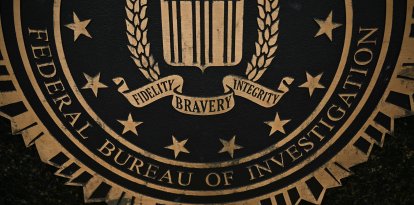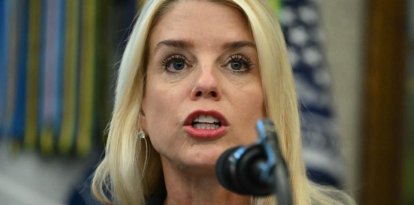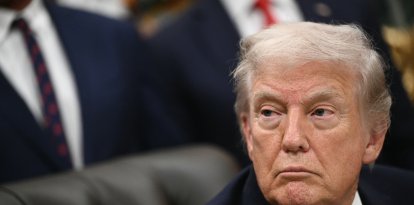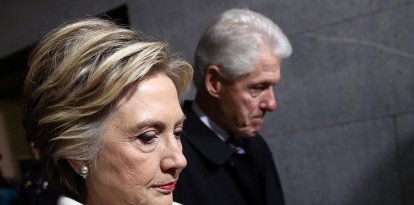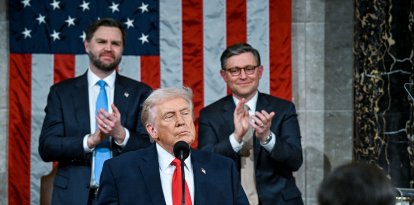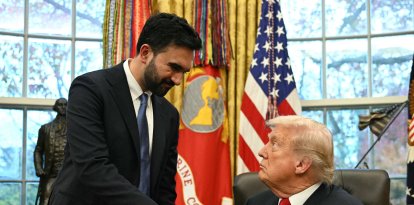The homeless divide the Supreme Court
The conservative majority leans toward politicians managing the situation of homeless people, while progressive judges criticize the criminalization of poverty.

(Frederic J. Brown/AFP)
The justices of the US Supreme Court (SCOTUS) were clearly divided on the homeless. In what will be the most important ruling on this matter in recent years, the conservative majority seems to lean towards letting homeless camps be run by politicians, while the three progressives put the focus on the rights of people forced to live on the streets due to lack of resources, in a tense discussion with the attorney for the city of Grant Pass, Oregon.
A fundamental sentence
The High Court must decide whether to support the local ordinances approved by the politicians of this small town that prohibited sleeping or camping in public places or, on the contrary, this regulation "criminalizes the 'homeless' status" and suspends its application. The sentence, in one sense or another, will be fundamental for the approach to a crisis that has not stopped growing in recent years, and that affects more than 600,000 people in the country, according to official figures. The importance of the ruling has led numerous politicians to position themselves on one side or the other, writing to the court in support of the arguments of one or the other.
The case that has reached the Supreme Court dates back to 2013, when Grant Pass, a town of about 40,000 inhabitants, approved ordinances prohibiting sleeping or camping on the street after complaints from neighbors about the problems caused by a growing homeless population on the streets, urinating and defecating in public, causing a serious public health and order problem for citizens. Three of the homeless affected reported in 2018 that these measures violated the Eighth Amendment, provoking litigation that has reached the Supreme Court after going through several courts and the Ninth Circuit Court of Appeals. Precisely the latter's sentences have generated numerous protests denouncing that it "ties" the administrations hand and foot in order to deal with these situations.
Who should legislate or judge homeless policies?
And here lies one of the keys that will determine the handling of this type of situation throughout the country. Who are the most appropriate people to legislate and confront this reality? A question with which the president of the High Court, John G. Roberts, launched with a slight nuance about his position, to focus the issue: "Why would you think that these nine people are the best people to judge and weigh those policy judgments?”
A question that Brett M. Kavanaugh added to in his question to a federal government lawyer: "I think one of the questions is, who takes care of it on the ground? Is it going to be federal judges? Or is it the local jurisdictions working with the nonprofits and religious organizations?"
Homeless status or situation?
The issue opened a strong debate between the three progressive judges and the lawyer. Elena Kagan put her finger on the second derivative that is being judged in this case, pointing out that there is a "homeless status" that would be criminalized with regulations such as the one approved in Grant Pass. Her dialectical exchange with Grant Pass attorney Theane Evangelis illustrates the debate faced by those who must address these situations:
Kagan: Could you criminalize homelessness?
Evangelis: Well, I don't think being homeless is a status like drug addiction.
Kagan: Being homeless is a status. It is the status of not having a home.
A question to which the president of the Court joined, pointing out that one of the main complications of these situations is precisely to determine whether it is a status or a situation, highlighting that it is something that can change quickly: "What is the analytic approach to deciding whether something’s a status or a situation of conduct? You can remove the homeless status in an instant if you move to a shelter or situations otherwise change. And, of course, it can be moved the other way as well if you’re kicked out of the shelter, whatever.”
Criminalize breathing in public?
Kagan herself, and her colleague Ketanji Brown, upped the ante by pointing out that sleeping is a "biological necessity" like breathing or eating, asking the lawyer if she would prohibit a homeless person from performing either of these two functions in public: "Sleeping It is a biological necessity. It’s sort of like breathing. I mean, you could say breathing is conduct, too. But, presumably, you would not think that it’s OK to criminalize breathing in public, and for a homeless person who has no place to go, sleeping in public is kind of like breathing in public."
Evangelis soon opened another front, stressing that there is no compassion or dignity in allowing people to sleep outdoors, even if they do so on mattresses. "We think that it is harmful for people to be living in public spaces, on streets and in parks. Whatever bedding materials, when humans are living in those conditions, we think that that’s not compassionate and that there’s no dignity in that."
"Being homeless is not a crime!"
Something that provoked the reaction of the third progressive judge of the Court, Sonia Sotomayor, who asked what would happen to all the homeless in the country if this type of policy were implemented across the country: "Where do we put them if every city, every village, every town lacks compassion and passes a law identical to this? Where are they supposed to sleep? Are they supposed to kill themselves not sleeping?"
While the hearing was taking place, dozens of people demonstrated at the doors of the Supreme Court with shouts of: "SCOTUS, now is the time, being homeless is not a crime!" and holding signs reading "Justice for Housing" and "Housing is a Human Right."















